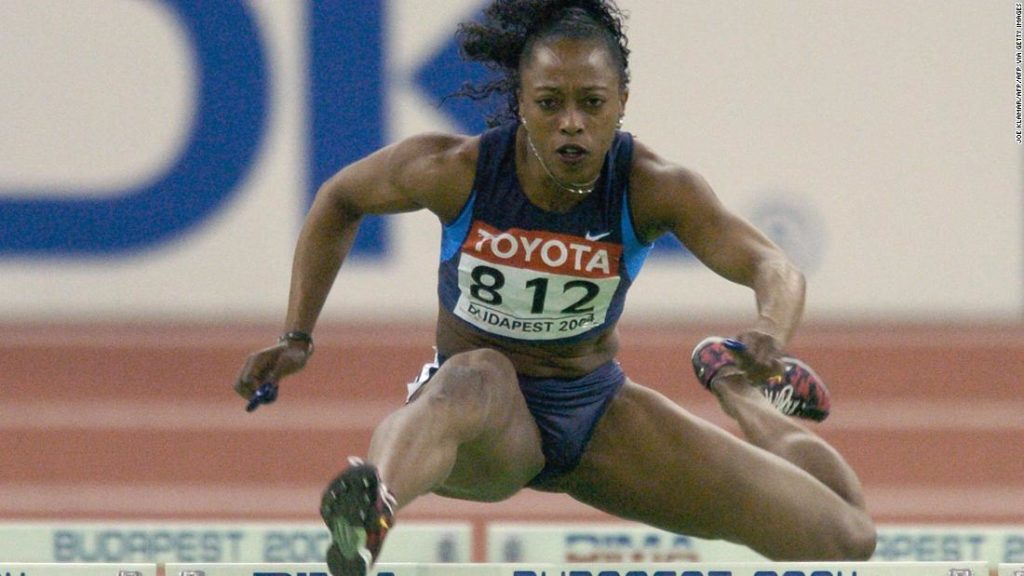While her time of 10.82 seconds was less than a tenth of a second faster than her four nearest rivals, it wasn’t just the nature of the race that made Devers’ win so special, but also the journey she had taken to get there.
In the years leading up to the 1992 Olympics in Barcelona, Devers endured a series of traumatic health complications — a “gamut of symptoms” which brought her close to retirement before her athletics career had even left the starting blocks.
Weight loss, hair loss, headaches, insomnia, bulging eyes and painful skin sores were some of the health issues that afflicted Devers in her early 20s, driving her to desperate measures over a two-and-a-half-year period.
“I looked like a monster … I couldn’t stand the way I looked,” the 54-year-old tells CNN Sport.
“I actually covered up my mirrors and stopped looking at myself. I stopped going out because when I went out, people would ask, ‘Hey, what’s wrong with you?’ and I had no answers.”
Around the time of the 1988 Olympics in Seoul, Devers says she had been running as slowly as she did in high school and failed to progress past the semifinals of the 100m hurdles, her favored event.
Her condition, which some doctors put down to overtraining, worsened when she returned home; at one point, her weight dropped to 79 pounds — 40 pounds less than her usual running weight.
“I had given a resignation speech to my coach saying that I didn’t want to take up his time because I’m out there competing or trying to compete and I’m pulling my hamstrings by jogging,” Devers remembers.
“There was a problem, (but) he wouldn’t let me resign, thank goodness, and said, ‘We’ll figure this out.'”
It was only after years of visiting health experts across the United States that Devers finally learned she had Graves’ disease, an autoimmune disorder which causes an overactive thyroid gland.
“Then the tears just started flowing,” she says of the moment she received a diagnosis. “Finally, somebody had an answer for me.”
Today, 30 years on from her Graves’ disease diagnosis, Devers wants to raise awareness for the condition and its accompanying symptoms — especially as July marks Graves’ disease awareness month.
“If there are 10 million people who could have Graves’ disease, then my job, our job is to make sure that 10 million people — they’re under a doctor’s care,” says Devers.
After her diagnosis in 1990, Devers received radiation treatment that caused painful blisters on her feet as a side effect of the medication. The situation got so bad that doctors came close to amputating her feet.
But through all the complications of Graves’ disease, Devers maintains that her health challenges propelled her to new heights once she was able to return to athletics.
“I always tell people that if I had my life to live over, I would ask for my Graves’ disease again because it’s made me who I am,” she says.
“I believe I’m stronger at having to go through what I went through … Everybody’s faced with challenges. We all feel like sometimes walls are closing in on us and there’s no way out.
“What do you do? You remember that strength and resilience that you have when you step on the line.”
Following her 100m victory in 1992, Devers went on to win golds in the 100m and 4x100m relay at the 1996 Games in Atlanta, making her one of just three women to successfully defend the 100m title at the Olympics.
Despite winning three world championship titles in the 100m hurdles, Devers’ quest for an Olympic medal in that event proved to be ill-fated.
In 1992, she was on track for a comfortable victory before hitting the final hurdle and staggering across the line in fifth place. Statisticians later calculated that, had she not stumbled on the final hurdle, Devers would have broken the world record.
Then in Atlanta four years later, she could only finish fourth in the final; in 2000, she pulled up in the semifinal with a torn hamstring, and in 2004, it was a calf injury that thwarted her progress.
However, her 100m gold in 1996 — when Devers edged out Jamaica’s Merlene Ottey after they both clocked the same finish time — still makes her the last American woman to win the Olympic 100m title.
At the Tokyo Olympics, which get underway later this month, Devers says she hopes an athlete from the United States can end the 25-year wait for a gold in the women’s 100m, but also admits she’s a fan of British sprinter and 200m world champion Dina Asher-Smith.
Off the back of a career that was shaped by the resilience and determination required to overcome her health battles, Devers is well-positioned to give advice to current Olympians who are approaching the Games after a year fraught with the confusion and uncertainty of the pandemic.
“You’ve got challenges, you’ve got stresses, you’ve got self-doubts,” says Devers. “Whether it’s swimming, diving, whatever your event is, when you step up to the plate, be ready to put your all on the line so that you don’t leave with question marks.”
Having competed up to the age 40, Devers still stays active and recently finished her first half marathon. Away from sport, she remains dedicated to raising public awareness of Graves’ disease.
“I’ve been dealing with things for 30 years,” she says. “I need to help people get to the finish line quicker than I got there.”
You may also like
-
Super League: UEFA forced to drop disciplinary proceedings against remaining clubs
-
Simone Biles says she ‘should have quit way before Tokyo’
-
Kyrie Irving: NBA star the latest to withhold vaccination status
-
Roger Hunt: English football mourns death of Liverpool striker and World Cup winner
-
‘Every single time I lift the bar, I’m just lifting my country up’: Shiva Karout’s quest for powerlifting glory

